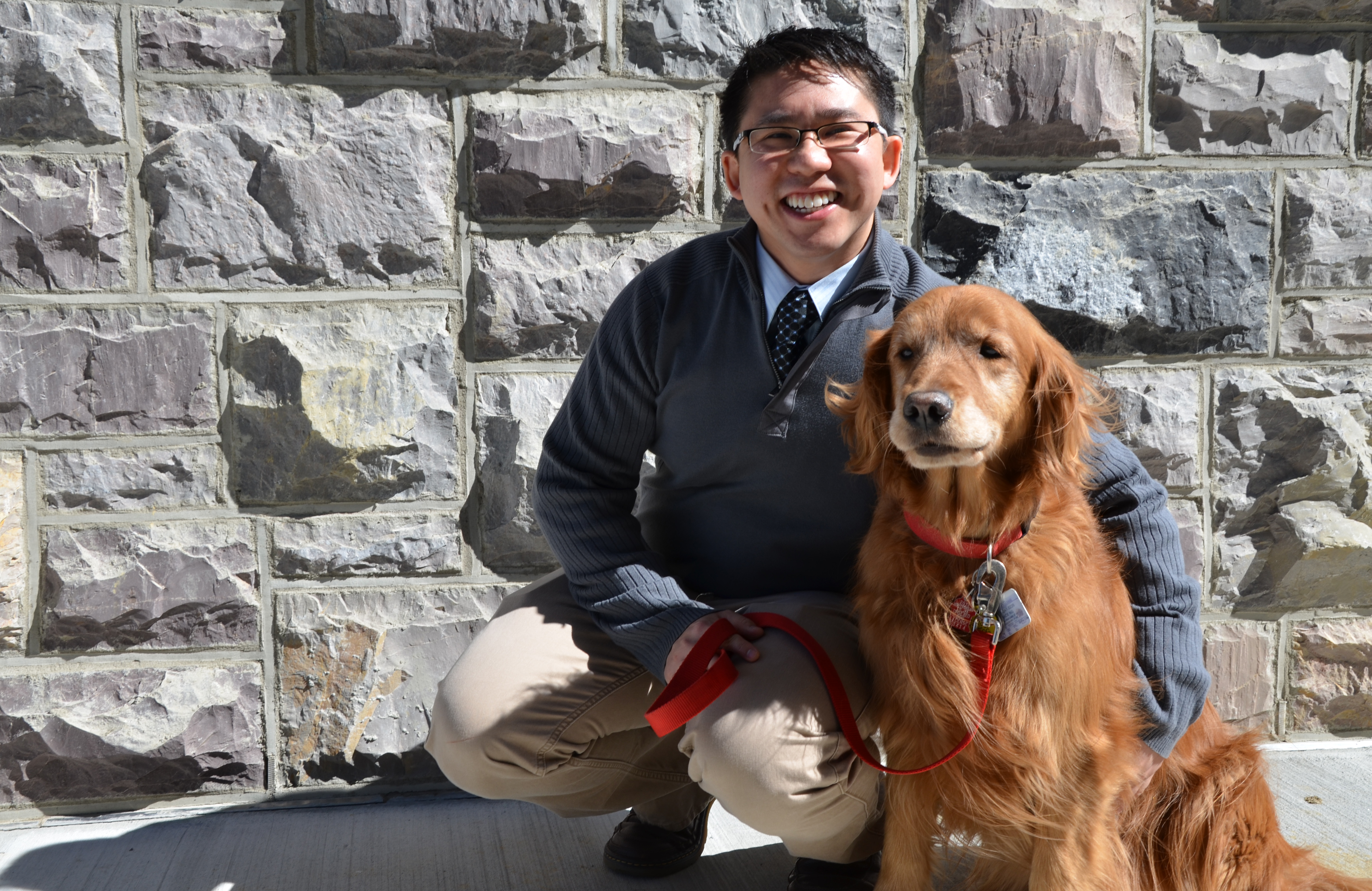Veterinary college's Zenithson Ng helps people through helping pets

Some people know from an early age what their destiny in life is. For Dr. Zenithson “Zenny” Ng of Rockaway N.J., a third-year clinical master's resident, that destiny was to become a veterinarian.
As a child, the northern New Jersey native asked his parents if he could have a dog. Not quite as pet-minded as their son, they told him that in order to get a dog, he had to write a 10-page essay about why he wanted one. Not easily deterred from his ownership goal, he did. He also got his dog.
Ng’s determination did not stop there. His eighth grade science fair project measured classmates’ blood pressure as they interacted with a dog, cat, bird, rabbit, or fish. His current master’s thesis at the Virginia-Maryland Regional College of Veterinary Medicine investigates the effect of pet therapy on salivary cortisol levels and behavior patterns of dogs themselves. Ng has dedicated his academic and professional career to the study of companion animals and their relationships with humans.
“I have always had a fascination with animals because they could help people and touch people in ways no human can,” said Ng who, in July, will complete his American Board of Veterinary Practitioners residency in canine and feline practice at the veterinary college. “I have spent my life with a philosophy of ‘helping people through helping pets.’ ”
He has practiced veterinary medicine by this dogma since graduating from Cornell University’s College of Veterinary Medicine, completing an internship at the American Society for the Prevention of Cruelty to Animals in New York City, and consulting at a veterinary hospital in Beijing, China, before moving to Blacksburg to begin his residency in 2010.
Ng is the first veterinarian to pursue a residency in human-animal bond studies in the United States, according to Dr. Bess Pierce, associate professor in the Department of Small Animal Clinical Sciences and director of the college’s Center for Animal Human Relationships. The innovative program at the Virginia-Maryland Regional College of Veterinary Medicine is the only one of its kind at a veterinary college. A unique research, teaching, and service undertaking, the program is part of a growing body of research and outreach on the therapeutic benefits of companion animals.
The local community has taken notice of Ng’s efforts, too. Virginia Tech students studying in the library, elderly residents in nursing homes and assisted-living facilities, and children in the Books to Barks reading program at the Blacksburg Library have all benefited from Virginia Tech Helping PAWS and its therapy animals. The 31-year-old founded this service mission in collaboration with student leaders from the college’s Companion Animal Club.
“The program allows certified teams of veterinary students, staff and faculty, and their pets to bring companionship and stress relief to local facilities that benefit from human-animal interactions,” said Pierce, who explained that this program was the impetus for the Outstanding Graduate Student Service Excellence Award Ng won this spring. “Dr. Ng has been instrumental in developing the entire program, from training and certifying therapy teams to scheduling and conducting visitations to the community.”
His first step was to become a certifying official for the American Kennel Club Canine Good Citizenship Test and to certify his own dog, a golden retriever named Grace, through Pet Partners, the largest therapy dog organization in the United States.
Although Ng has been an animal lover his entire life, he did not come to Blacksburg with any animals. Eight-year-old Grace was one of his first patients at the Veterinary Teaching Hospital’s Small Animal Community Practice Clinic. Grace survived cutaneous lymphoma, but her owner, who also had cancer, unfortunately passed away. Ng officially adopted Grace as she continued her weekly chemotherapy treatment, despite her prognosis of not surviving past a few months.
Remarkably, Ng said that “she has been in remission for the past two-plus years.”
Ng has not only brought Grace to therapy dog visits throughout the community, but also implemented her with work at the Veterinary Teaching Hospital. In addition to de-stressing and teaching veterinary students, she has been especially comforting for clients — and their children — in receiving difficult news or saying the final good-bye to a beloved pet. Ng and Pierce recently renovated the hospital’s Consultation Room for this very purpose.
“Euthanasia is one of the distinct privileges veterinary medicine allows that human medicine does not,” Ng said. “Although it is the most difficult decision a pet owner will ever make, it can be the most humane for the animal. We, as veterinarians, can end pain and suffering and can compassionately help owners cope with the grief of loss by providing them closure and the comfort to know their animal passed peacefully and in the presence of loved ones during their last moments.”
Ng has not yet decided what he will do after his residency, but he is certain that he will continue his life-long work on the human-animal bond, whether it be through leading veterinary care in private practice, shelter medicine, service animal organizations, or human-animal interaction programs.
“I believe this residency has opened the door for many wonderful opportunities,” Ng said.










